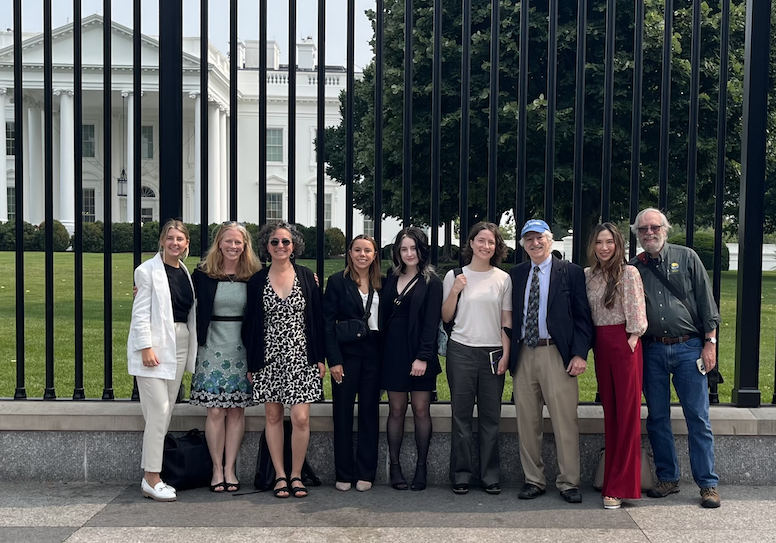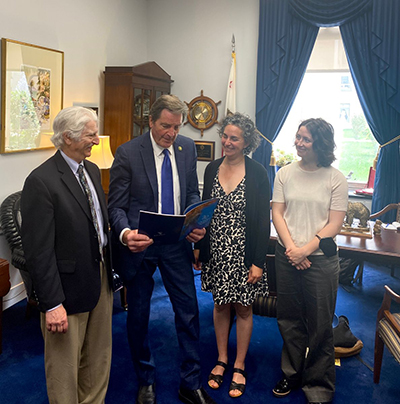Ocean Climate Action Plan offers Cure for Post-Pandemic Economy with Solutions for Climate Emergency
| by OCAP Team
Adds Missing Pieces to House Climate Change Framework

Environmentalists applauded the Green New Deal that Democrats launched in 2019, but there was something big missing.
Something covering 139 million square miles and 71 percent of planet earth, to be exact.
“There wasn’t much ocean in it,” said Jason Scorse, director of the Middlebury Institute’s Center for the Blue Economy. “We said, ‘We better get on this and let the administration and Congress hear about it.’”
He teamed up with David Helvarg, executive director of solution-oriented citizen engagement nonprofit the Blue Frontier and, in 2020, they gathered hundreds of NGOs, legislators, environmental justice activists, industry leaders, and academics in a broad coalition called Ocean Climate Action.
“Many mainstream environmentalists seem to think environment ends at the water’s edge,” Helvarg adds. “But there are no climate solutions without the ocean.”
While CBE provides economic and policy analysis, Blue Frontier furnishes veteran lobbying oomph and citizen connectivity on the ground.
The group published the Ocean Climate Action Plan in July 2020 and through their continued engagement saw many of their recommendations become policy.
While the coalition has made big strides, there’s still plenty of work to do. That inspired a progress check released the week of World Ocean Day, called “Turning U.S. Ocean Climate Policy Into Action.”
Environmental policy students at the Institute interviewed hundreds of leading experts and combed through hundreds of pages of documents to create the report.
One of them, Mallory Hoffbeck MAIEP ’23, found herself in Washington, D.C., in June, meeting with legislators and officials along with grad students selected from across the country as part of Capitol Hill Oceans Week.
“It is overwhelming and at times nerve-racking,” she says. “Powerful people make decisions based on this. It’s a lot of responsibility.”
The report found the Biden administration has made progress and also highlighted what should come next.
“Most importantly, it identifies priority actions for the Biden-Harris administration to achieve its ocean climate goals and position the U.S. as a global leader in this rapidly growing area of climate action,” said Sarah Guy of the nonprofit and coalition member Ocean Defense Initiative.

As Hoffbeck and her fellow students graded out the administration, the checklist included big challenges like “minimize and address ocean acidification” and “reduce plastic pollution and emissions,” as well as “expand responsibly sited offshore wind and phase out offshore drilling” and “promote green shipping and ports.”
Along the way, an interesting thing happened: Hoffbeck felt her apprehension at holding senior decision makers to account recede.
“I learned how to have meetings like that—and it’s not as difficult as I thought,” Hoffbeck says. “I can speak from expertise from research I’ve done with more confidence, and more integrity, and [assume] the responsibility of taking on those issues.”
The ideal outcome, she continues, is keeping the lens locked on policy progress with planetary implications.
“More than anything, we want to get as much attention as we can on the issues we’ve been researching and think are the most important,” Hoffbeck says, “to get as much momentum behind those actions as possible.”
Scorse feels hopeful.
“The administration is taking our input into account, which is a big deal,” he says. “They’re trying to balance some tricky issues, and they’re on the right track.”
Flash forward to July 2023. Hoffbeck is in the middle of the Pacific Ocean, somewhere between Hawaii and Fiji, and feeling at home.
Her latest journey will traverse two months; 3,000 miles; the equator; Kiribati, a Pacific Island nation facing sea level rise, global warming, fishing policy, and loss of freshwater resources; and the world’s largest coral archipelago, the Phoenix Islands, a UNESCO World Heritage site.
There are reasons she’s comfortable there. For one, she’s aboard a research sailing vessel serving as a teaching assistant with Sea Education Association, leading conservation management classes. She supports students as they compose articles on marine policy topics of their choice—think marine plastics, whale population health, and deep-sea mining—and giving some guest lectures, including a talk about her work on the ocean report at the D.C. meetings.
“I now have the confidence to be honest about what I know and what I don’t know, and be clear about it,” she says. “That’s a good feeling.”
Read more at Middlebury’s Ocean Climate Action campaign page and oceanclimateaction.org and via the “Turning U.S. Ocean Climate Policy into Action” report.
| by OCAP Team
Adds Missing Pieces to House Climate Change Framework
On June 8th, 2022, World Ocean Day, the Biden-Harris Administration announced the creation of a whole-of-government Ocean Climate Action Plan. The Center for the Blue Economy, Blue Frontier, and our coalition of Ocean Climate Action partners celebrate this announcement! Is it coincidence that they have titled it the Ocean Climate Action Plan? We think not!
There is renewed momentum for the Senate to use the budget reconciliation process to pass climate legislation. Ocean-based climate solutions are key to solving the climate crisis, and there is no time to waste. We may not have another chance like this for many years to come!